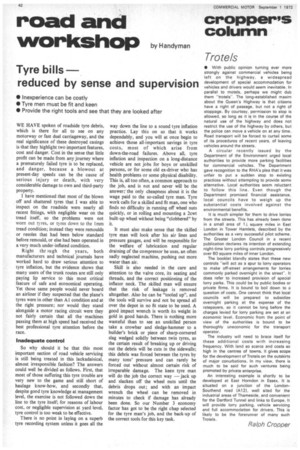cropper's column
Page 48

If you've noticed an error in this article please click here to report it so we can fix it.
Trotels
• With public opinion turning ever more strongly against commercial vehicles being left on the highway, a widespread development of special accommodation for vehicles and drivers would seem inevitable. In parallel to motels, perhaps we might dub them "trotels". The long-established maxim about the Queen's Highway is that citizens have a right of passage, but not a right of stoppage. By courtesy, permission to stop is allowed, so long as it is in the course of the natural use of the highway and does not restrict the use of the highway by others, but the police can move a vehicle on at any time. Road transport will be forced to curtail some of its procedures of recent years, of leaving vehicles around the streets.
A circular recently issued by the Department of the Environment urged local authorities to provide more parking facilities for commercial vehicles. The Department gave recognition to the RHA's plea that it was unfair to put a sudden stop to existing practices without attempting to provide some alternative. Local authorities seem reluctant to follow this line. Even though the Department promised financial assistance, local councils have to weigh up the substantial costs involved against the environmental benefits.
It is much simpler for them to drive lorries from the streets. This has already been done in a small area of 1 T, square miles in East London in Tower Hamlets, described by the authorities as a very successful pilot scheme. The Greater London Council in a recent publication declares its intention of extending night-time lorry parking controls progressively over 60 square miles of inner London.
The booklet blandly states that these new controls ''will act as a spur to lorry operators to make off-street arrangements for lorries commonly parked overnight in the street". It does refer to increased provision of special lorry parks. This could be by public bodies or private firms. It is bound to boil down to a question of costs. One cannot think that local councils will be prepared to subsidize overnight parking at the expense of the ratepayers, so it cannot be long before the charges levied for lorry parking are set at an economic level. Economic from the point of view of the authorities is bound to be thoroughly uneconomic for the transport operator.
The industry will need to brace itself for these additional costs with increasing frequency. With land so scarce and costs so high in the centres of towns, it gives scope for the development of Trotels on the outskirts of major conurbations. In my view, there is much to be said for such ventures being promoted by private enterprise.
An interesting example is shortly to be developed at East Horndon in Essex. It is situated on a junction of the LondonSouthend road 1Al2), well sited for the industrial areas of Thameside, and convenient for the Dartford Tunnel and links to Europe. It will provide lorry parking, vehicle servicing and full accommodation for drivers. This is likely to be the forerunner of many such Trotels.
Ralph Cropper


































































































